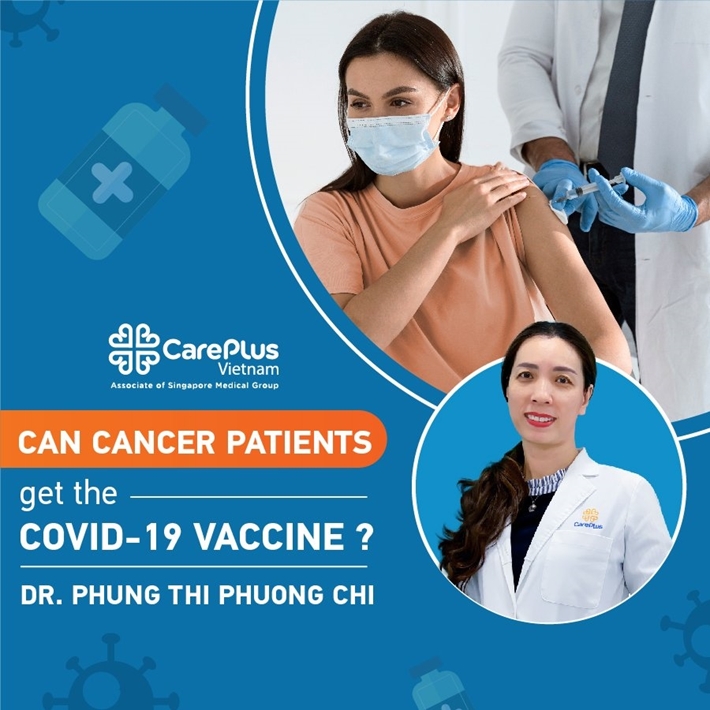Can cancer patient get the Covid-19 Vaccine?

7/14/2021 4:46:43 PM
Many people who have cancer or undergo cancer treatment wonder if it is safe to get one of the approved COVID-19 vaccines. We know that people with underlying medical conditions, such as cancer or heart disease, have a higher risk of developing a more severe illness if they have Covid.
Cancer prevention associations and networks such as ASCO, ESMO, NCCN, ANZTCT, HSANZ, MOGA have made recommendations for cancer patients as follows:
Can cancer patients get the Covid-19 vaccine?
Currently, cancer patients can be vaccinated unless there are ingredients in the drug that cause general contraindications. However, you need to be advised about the vaccine's safety and the possibility that your immune system will respond less well to the vaccine, and you still must continue to take preventive measures against Covid-19. Experts say that vaccines help reduce the risk of severe symptoms when infected with Covid-19.
Can a patient being treated for cancer get the vaccine?
Up to this point, information still shows that there are no contraindications to vaccination during cancer treatment. There is extensive experience with the safety of other vaccines when patients undergo cancer treatment, such as chemotherapy, immunotherapy, and radiation therapy, often in between cycles of cancer treatment. To ensure patient safety and ensure vaccine efficacy.
Can a patient who has been treated for cancer get the vaccine?
Patients who have been treated for cancer can get the vaccine just as safely as other people. Some studies have shown that mRNA-type vaccines can affect imaging results in cancer. For example, axillary lymphadenopathy in breast cancer patients may be more common after vaccination with Moderna and Pfizer-BioNTech.
A study by SBI (Society of Breast Cancer Imaging) showed that after vaccination with Moderna, a feeling of tightness and oedema in the armpit was observed in 11.6-16% of breast cancer patients, which is expected. Out on average, 1-2 days after injection, lasting 2-4 days.
Cancer treatments and timing of Covid-19 vaccination
- Patients undergoing chemotherapy and immunosuppressive therapy: Vaccination should be given when there is no leukopenia. Because of 24-48 hours after vaccination, there may be fever. If accompanied by leukopenia, you need to be hospitalized for monitoring. In some cases, it is necessary to delay vaccination, such as when chemotherapy in patients with cancer of the hematopoietic system.
- Patients are undergoing immunotherapy, hormone therapy, radiation therapy: no time limit for vaccination.
- Patients are taking corticosteroids: Corticosteroids reduce the immune response, so you need to consult with your treating doctor to choose a specific time.
- Are being treated with Rituximab, Blinatumomab, Anti-thymocyte globulin, Alemtuzumab and other Lymphocyte-lowering drugs. These drugs reduce Lymphocytes, so the best vaccine effect is at least three months after completion of treatment. However, if the Covid-19 epidemic situation is too difficult, you may consider vaccination because it also provides partial protection.
- Patients are undergoing surgery: because vaccines can cause fever after 24-48 hours, you need to avoid vaccination for a few days before and after surgery because turmoil may delay surgery.
- Patients who have had surgery on axillary lymph nodes (including breast cancer): should be vaccinated in the contralateral arm, as the vaccine may enlarge the axillary lymph nodes and aggravate brachial oedema.
- Patients who have received stem cell therapy and CART: If treatment is within three months or B cells are low, it is necessary to consult carefully with the treating doctor to consider vaccination.
- Patients who have received extracorporeal photopheresis or hemodialysis: the treatment plan should be implemented at least two weeks after vaccination.
- Patients with severe allergies to chemicals or monoclonal antibodies: The chemical's polyethene glycol and polysorbate components can be found in vaccines, so if you are allergic to these drugs during treatment, you should take special care.
- Patients who have had a severe allergic reaction to the first dose of vaccine: a second dose should not be given, except under the supervision of an allergist.
- If you've been infected with Covid-19: you should still get vaccinated after being infected with Covid-19 (although you could theoretically wait 3-6 months after being infected to get vaccinated again).
-----